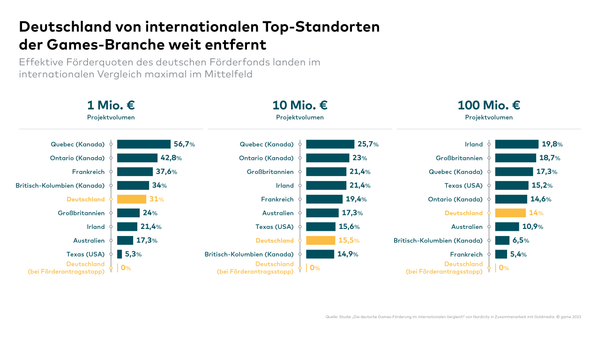German games funding too low and unreliable in international comparison




Together with Games Germany, the game has presented an international comparative study on games funding prepared by Goldmedia and Nordicity. It shows that the German system can keep up with smaller projects, but only as long as the funds are not exhausted. In order to create a level playing field, an international tax model is needed.
During a video call with representatives of the German press, the industry association game presented the results of the study 'German Games Funding in International Comparison' and reiterated its call for a tax model.
The study was commissioned by the association in cooperation with Games Germany, the association of state funding bodies and state networks. The study was carried out by Goldmedia and the Canadian company Nordicity. They compared the German funding model with the models in the USA, France, Great Britain, Ireland, Australia as well as Canada and three Canadian provinces, where different models exist.
For each of three fictitious productions, an indie production with a budget of one million euros, an AA production with a budget of ten million euros and an AAA production with a budget of 100 million euros, a best-case scenario was created in which all eligible costs were recognised and the maximum possible quota was achieved. However, Juliane Müller, managing director of Goldmedia, pointed out that according to this definition, no AAA production had ever been realised in Germany and therefore had not been funded. On the basis of the sample calculations, the actual advertising quotas were then determined and compared.
At first sight, the result is quite acceptable. Although Germany does not come out on top in any of the comparisons, it scores in the solid midfield, especially for indie productions. But only on one condition: that funds are available. If there is a freeze on applications, as is currently the case, the effective funding rate drops to zero and Germany slips to the bottom of the table.
"The study 'German Games Funding in International Comparison' is a clear wake-up call: the framework conditions for games development in Germany are not internationally competitive. This means that the German government will not be able to achieve its self-imposed goals of developing Germany into a lead market unless it orients itself more strongly towards international standards. The study now shows in black and white what these standards are," says Felix Falk, the association's managing director.
He therefore reiterates his call for an increase in the budget and the introduction of a tax model: "It must be Germany's claim not only to watch but to play a role in one of the most dynamic and largest media markets in the world. To achieve this, we need a short-term increase in funding to €125 million for 2024 to lift the current freeze on funding applications. In addition, tax incentives are needed, as they have long been standard in almost all successful gaming locations, according to this study. This is the only way to create the planning security and reliability that will make Germany one of the most successful international host cities in the long term.
When asked, Falk explains that the tax model is not about achieving the highest tax rate. Germany has other advantages to offer as a location. But: "The most important thing is reliability," says Falk. This is where Falk sees the confidence of the German and international industry in Germany as a location dwindling due to the ping-pong of subsidies. For example, since the start of federal funding, there has not been a single international studio of any significant size relocated in Germany, as is the case in Eastern European countries. And Falk also sees the proven boom in new studios in Germany in jeopardy. If the Bundestag does not increase the funding budget again in the upcoming budget negotiations, he says, it could spell the end for many smaller developers. "That worries me," says Falk.